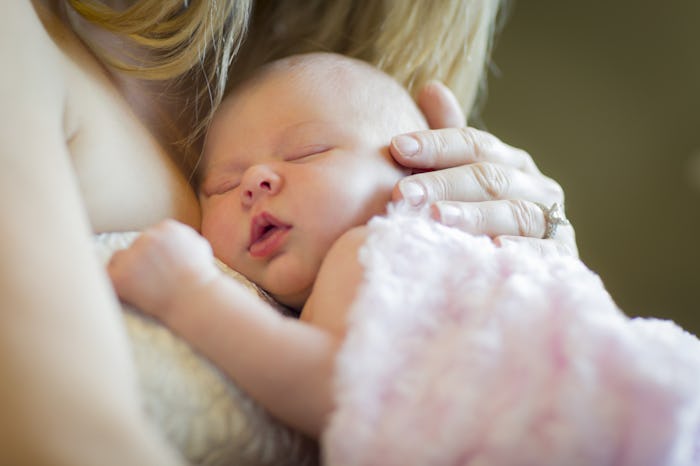Life

Hugging Your Baby Is One Of The Best Things You Can Do For Her Brain
From the moment you have a baby, your life becomes all about doing everything you can for the benefit of your little one's health and well-being. Some of those things you do because you learned they're important, like driving her home from the hospital in a car seat. Others are things you do because they come naturally to you, like feeding her when she's hungry. Snuggling and cuddling fall into the latter category: Not only is it your instinct, but affection is actually a baby brain-booster, too. So what happens to your baby's brain when you hug her?
You've probably heard all about the many magical perks that come with skin-to-skin contact between parents and newborns: Studies have shown that this method of holding (also known as kangeroo care) "improves oxygen saturation rates, better regulates an infant's body temperature, and conserves a baby's calories," according to the Cleveland Clinic, resulting in less crying and quicker weight gain, as well as heart rate stabilization. There are benefits for moms, too: A review published by the Cochrane Library revealed that moms who had skin-to-skin contact with their babies soon after birth breastfed their babies for a longer period of time and had a higher rate of successful first breastfeeding sessions. And naturally, kangaroo care is helpful when it comes to bonding; as a 2014 article published in The Journal of Perinatal Education explained, skin-to-skin immediately after birth results in the release of the feel-good hormone oxytocin.
Skin-to-skin contact is so essential in so many ways, it's really no surprise that your baby's brain benefits from the practice, big-time. But it is pretty incredible that simply holding your baby close can do her so much good!
1Negative Experiences Are Counteracted
Early medical procedures (like being stuck with a needle) can affect the way a premature baby's brain perceives touch. But researchers from Nationwide Children's Hospital in Columbus, Ohio, discovered that early hugs can help to offset negative experiences so that babies learn to experience affection as pleasant rather than overwhelming, reported Motherly.
2Brain Growth Gets A Boost
You might remember hearing the tragic tales of Romanian orphans whose early experiences with neglect actually shrunk the gray matter of their brains. Similar results have been observed in children of neglectful parents in general, and it all comes down to the fact that tactile stimulation promotes brain development during a "sensitive period," as University of Maryland child development researcher Nathan Fox explained to LiveScience.
"The idea is that those kids who develop a secure attachment actually show enhanced brain activity at age 8," said Fox.
3Emotional Self-Regulation Is Promoted
Touch therapy and skin-to-skin contact have also been shown to improve babies' ability to regulate their own emotions, which helps to build resilience during times of stress, according to research conducted at the Bar-Ilan University's Department of Psychology and published in the journal Peptides.
4Cognitive Development Is Enhanced
Hugs don't just help your baby in the short-term. A 2014 study published in the journal Biological Psychiatry found that maternal skin-to-skin contact "enhanced prematurely born infants' physiological organization and cognitive control" for the first 10 years of life, Psychology Today reported.